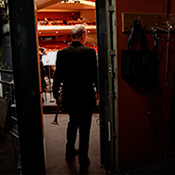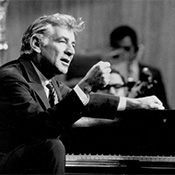
What’s in a season?: A glimpse at our 2017.18 Classics programs
David Lewellen
PUBLISHED
Tagged Under: 2017.18 Season, Bernstein Festival, Classics
With no music director in place for the Milwaukee Symphony’s 2017.18 season, more conductors will get a chance to show off a little.
Usually one of the first pieces to fall into place for the classical season is the schedule and preferred repertoire of the music director. But since Edo de Waart’s tenure will end this season and no successor has been announced, the MSO’s slate was wide open. Patrick Castillo, a New York-based composer and consultant who put together the recently announced season, said that in a sense, it became an opportunity — many previous guest conductors, or debut conductors, got a better choice of pieces that a music director might normally have kept for himself.
MSO President and Executive Director Mark Niehaus has said more than once that every guest conductor is a potential future music director, and now the scrutiny is naturally higher. But Castillo cautioned that the symphony is “not handicapping the horse race” by who gets the particularly juicy assignments. The reality for the coming season, he said, is that conductors and agents knew that “basically anything is fair game, and they’ve been less shy to ask for those pieces. It’s exciting for a young conductor to get a chance to come in and swashbuckle.”
As well as conductors’ preferences, Castillo has to balance the greatest hits and the rarities, the pianists and the violinists, the 1700s and the 2000s, and the available dates. If “a very high-target conductor that we’ve talked to for years” finally has an opening, that person will get wide leeway in programming.
But most often, the MSO artistic staff will have an anchor piece in mind — the long, ambitious work that makes up the second half of the program — and ask for a conductor’s ideas on what to put with it. Or perhaps a soloist has committed to that date, and the conversation is what concerto to program and what would complement that. “It’s always funny when a debut conductor says, ‘I want to do Bruckner 7,’” Castillo said wryly. But on the other extreme, “it’s quite rare that I reach out to a conductor with a pre-formed program.”
In putting together two or three or four pieces on one evening, “the most fun and most rewarding is figuring out what’s going to work,” Castillo said. “You can’t always explain verbally why it makes sense, but it does.” As an example in the coming season, he cited the all-American program for January 12 and 13, 2018, Copland’s Quiet City, Bernstein’s Serenade after Plato’s Symposium, and John Adams’ Harmonielehre.
The orchestra keeps a repertoire database, showing at a glance when they last performed any particular piece and who conducted. Beethoven or Tchaikovsky symphonies might be performed every few years, but “it would be a different answer for Stockhausen,” Castillo said, referring to the experimental German composer who died in 2007.
For the MSO’s 2017.18 season, the orchestra learned of available dates in the Marcus Center’s Uihlein Hall in the fall of 2016. That represents almost no lead time in the classical music world, where some orchestras and opera companies plan five years ahead. But Castillo isn’t complaining; every orchestra has their own logistical challenges. Often he will confirm the conductor and repertoire first and the date second — the reverse of what groups with more advance notice can do.
Theme programming for the coming season centers around the centenary of Leonard Bernstein’s birth — an opportunity to program not only his work, but that of many other American composers, and of composers that Bernstein loved to conduct, such as Beethoven and Mahler. That is why the classical season will conclude June 15 and 16, 2018, with Bernstein’s Chichester Psalms and Beethoven’s Ninth Symphony. And in the meantime, Castillo is already hard at work on ideas for the 2018.19 season.



